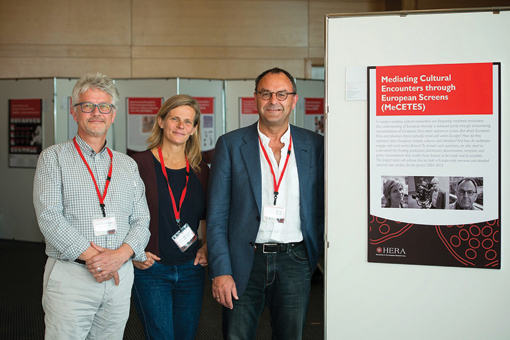Encountering Europe on Screen

Launching the MeCETES project in Dubrovnik, Croatia, in 2013. (Left to right: Professor Andrew Higson, Professor Caroline Pauwels and Professor Ib Bondebjerg)
About the MeCETES project
But while policymakers have been keen to promote intercultural dialogue through the development of a ‘European’ media sector, knowledge is limited about which European films and television drama series actually travel well and what role these fictions play in constructing a sense of European citizenship and identity. ‘Mediating Cultural Encounters through European Screens’ (MeCETES) aims to answer these questions. This three-year project, sponsored by a €1 million grant from Humanities in the European Research Area under its ‘cultural encounters’ programme, draws together an international team of researchers based in three universities:
- University of York (UK) – Led by Professor Andrew Higson (the Project Leader), who is known for his contribution to debates about national and transnational cinema, the York team focuses on contemporary European film, and includes myself (Huw Jones) and project administrator Denise Mitchell, as well as an affiliated PhD student, Roderik Smits.
- University of Copenhagen (Denmark) – Led by Professor Ib Bondebjerg, who has published extensively on Danish, Scandinavian and European screen media, the Copenhagen team focuses on contemporary European television drama, and includes Eva Novrup Redvall, Henrik Søndergaard and Rasmus Helles.
- Vrije Universiteit Brussel (Belgium) – Led by Professor Caroline Pauwels, an expert on European cultural and media policymaking, the Brussels team focuses on European audio-visual policy, and includes Ilse Schooneknaep and Tim Raats.
The project also involves 11 associate partners representing the views of industry professionals, funding bodies and policymakers from across Europe, as well as an advisory board made up of academics from several different universities, disciplines and countries. Our approach combines a Europe-wide overview of the production, distribution, reception and policy circumstances which enable European films and television dramas to be made and circulate, together with specific national case-studies, for the period 2005-2015. This involves utilising a variety of methods and sources, from quantitative data in industry reports, public databases and audience surveys, to interviews with industry players, audience focus groups and the qualitative analysis of media texts.
 Learning on Screen
Learning on Screen